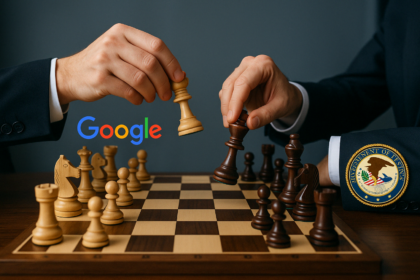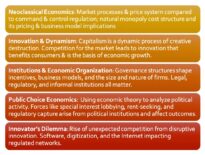
With my work increasingly entrenched in Washington, D.C., state capitols, and the public policy battles shaping entrepreneurship and venture capital, I’ve found myself staring down a familiar name in tech: Google. Again. For many of us, the latest antitrust accusations is déjà vu, about privacy, about data, and control – whether it’s Apple, Microsoft, X, or Facebook, it’s just another headline showing that policy makers have shifted their attention from the last feint to the next, but it’s with this headline that we might take the opportunity to better explain what’s really going on, and why this is a world not best left to legislators.
Today, headlines screamed “search engine monopoly,” with the announcement that the Justice Department is going after Google for their, well, search engine monopoly. Today. 2025. What is a feint you might ask? A manufactured battle to obscure the actual maneuver behind the curtain. Rest assured my friends! We can rely on Representatives to have our backs… twenty years too late. Just as they protected our privacy from the evils of Facebook, fought that Apple actually makes money from selling us things we want *gasp,* and ended spam email by outlawing it (wait…?), my heart relaxed a little knowing that Google’s control of us through search is almost at an end *yay*
Maybe that’s not what’s really going on.
Article Highlights
The DOJ vs. Google: A Not-So-New Chapter
The U.S. Department of Justice’s first antitrust lawsuit targeting Google’s search dominance was filed in October 2020, more than 20 years after Google effectively became the de facto gateway to the internet. The lawsuit alleged that Google had used illegal, exclusionary tactics to maintain monopolies in search and search advertising, namely by paying billions to device manufacturers and browser companies to make its search engine the default.
Not the only, restricted to that, mind you, but the default. Shame on them.
This isn’t the first time antitrust litigation dominates what’s going on through the internet. Back in 1998, Microsoft stood trial for bundling Internet Explorer with Windows, choking off competition and stifling Netscape into oblivion. I mean come on, who would think that an Operating System should manage how we operate our use of the internet, right?! Still, that case came to define a generation of tech regulation, as innovation evolves through being intertwined to drive adoption only to be threatened with being ripped apart because interoperability as actually valuable.
Today’s Google case echos that legacy, but the stakes are wildly different, far more strategic, and frankly, far more dangerous, because it’s that threat of preventing interoperability (breaking up a fabricated idea of a monopoly) that has turned the internet from decentralized bastion of free speech into a siloed internet effectively for newcomers, only TikTok, Facebook, X, reddit, and the suite of Google services you use.
That’s a wordy way of saying that I want you to look at how a government’s seemingly good intention to protect us from Big Tech, actually results in our being limited to little more than what Big Tech allows.
A Timeline of Search Dominance with the Hidden Hand of Chrome
Let’s rewind.
Google launched in 1998, and by the early 2000s, it was clear: they’d built a better mousetrap. AltaVista, Ask Jeeves, Yahoo, and even Microsoft’s early attempts (MSN Search, Live Search) were sluggish, spam-riddled messes. Google simply worked better.
As one can and should expect, everyone flocked to Google, users and advertisers alike. Monopoly? Certainly not, but can you see how politicians can start to assert as much, suggesting that Google must be doing something nefarious, rather than actually just being substantially better.
Google Chrome launched in 2008. While Firefox and Internet Explorer squabbled over tab organization and plug-in support, Chrome offered speed, simplicity, and seamless integration with Google Search – which people wanted. And just like that, search wasn’t just something you did, it was woven into the experience of being online, as it should be. Let me ask you again, monopolization? Was anyone forced to use that or did Google prevent alternatives?
By 2012, Chrome overtook Internet Explorer as the most used browser globally. This wasn’t anticompetitive. It was competitive. Google didn’t cheat. They built a user experience so frictionless that opting for anything else felt like dragging a rake across concrete.
Then came Android. Google’s mobile operating system gave them another weapon in the distribution war: preinstallation. Android phones came bundled with Chrome and Search. Google paid Apple billions annually to ensure its search remained the default on Safari. Critics cry foul, but let’s be honest—this is how competition works. You want market share? Win the deals. Win the users.
Interestingly though, as government oversight increases, we get overregulation of data, privacy, security, and IP, such that as the internet evolved into something people wanted, politicians could wield that to demand more of companies – companies that could AFFORD it -> making it difficult for better alternatives to emerge from new competitors among startups.
So Why Now?
If this case is about something Google has been doing for two decades, why is the Justice Department hitting the gas now? Who stands to gain by ensuring entrepreneurs can built a better search engine? Heck, can anyone build a better search engine when regulations throughout the world make it prohibitively expensive to try?
Or might it be because AI is overtaking Search, and Washington wants to preemptively shape who controls it.
Let’s be real: most of us now ask ChatGPT, Grok, Perplexity, or even Siri the questions we once typed into Google. Search is becoming a second-order tool. What matters more is which AI you use, and which platform quietly nudges you to use it. Lesson learned decades ago? The platform pushes us to the technology we use.
Google’s control of Chrome, Android, and its own AI Gemini matters even more because these aren’t just platforms, they’re gateways. They decide where your queries go. And if Chrome defaults to Gemini, and Android defaults to Gemini, and Search defaults to Gemini, then Google becomes your default intelligence provider — not just your search engine.
Microsoft knows it. That’s why they’re jamming Copilot into Windows and Edge. That’s why Bing pivots to AI. That’s why X replaced search with Grok. The internet’s interface is shifting from queries to conversation, and the DOJ’s case seeking to break up a so-called monopoly on search engines, when search engines are dying, likely seeks to intercept Google before it owns that future by default.
And the feint? They’re going after Google’s monopoly (what monopoly??) on search (who cares?)
What’s at Stake
U.S. District Judge Amit Mehta already ruled in September 2023 that Google illegally maintained its monopoly over search. Now, the case has moved to the “remedies” phase, where the DOJ is asking for Google’s proverbial limbs.
Their demands?
- Divest Chrome. Yes, the world’s most popular browser. Carved from Google.
- End exclusive distribution deals with Apple, Samsung, and Android partners that set Google Search as the default.
- Ban Google from using similar tactics for AI — A HA! Meaning Gemini can’t be preinstalled, featured, or prioritized unless other AI tools get the same treatment.
Now, presumably, that will mean the same requirement applies to Microsoft, X, and Apple… heck, I don’t want to have to use Amazon’s AI when I’m shopping, so clearly, in fairness of equal application of the law, Amazon won’t be able to default to Alexa either. Right? Right??
David Dahlquist of the DOJ calls it a mission to “restore competition.” But let’s call a spade a spade: this isn’t just about fairness. This is regulatory sabotage ahead of a platform shift. And let’s call a, I don’t know, a diamond a diamond: can investors really capably fund entrepreneurs with better solutions, able to overcome all that the Big players have been forced to put in place because of regulation?
Because if Google can’t favor its own AI, neither can Microsoft. Or X. Or Meta. And that’s where things get interesting because I want my open-source AI built on a decentralized internet where on one has control, and I want it to use all the data on X and Facebook…
Speaking of Amazon: When Google Fought Before
In the EU, Google was fined €2.42 billion in 2017 for favoring its own comparison-shopping service. Yet Google adapted, survived, and maintained other dominance, but in the process, Amazon pushed us all to shop there instead of anywhere else. Was Amazon wrong? That was the consequence of a government intervening in a free market to fabricate the impression of monopolistic behavior – hundreds of thousands of stores shuttered because Google was forced to divest their push to help us shop everywhere.
In the U.S., Google has mostly dodged breakup demands, because, in fairness, any half-wit in innovation knows that what Google has isn’t monopolistic. And while the Microsoft browser/OS case 25 years ago nearly split that company in two, it also taught the tech world that lawfare is economic warfare. Antitrust isn’t always about protecting the consumer, it’s a geopolitical move to shape markets and control.
Which brings us back to now.
Let’s say Google is forced to divest Chrome. What happens?
- Google’s AI integration in Chrome is disrupted.
- Android may have to open up default settings to all AI providers equally.
- Other browsers, Edge, Safari, even Firefox, get to insert their own AI by default.
- And suddenly, Google isn’t the default assistant for your digital life. Grok is. ChatGPT is. Copilot is.
And you might be thinking, isn’t that what we want? That’s the goal. You’re missing the point; such lawsuits aren’t about punishing monopolists. They’re about establishing the next ones. And those who play this game, with legislators, people like myself, are the people who decide the rules of the game by which those next emerge.
Consider:
- Tesla isn’t going to dominate the electric car market because they’re inherently better, it’s because they’ll have charging stations throughout the U.S.
- You’re not flying Delta because you love Delta, it’s because they pay to control the airports and terminals you need.
- Crypto beyond Bitcoin failed to meaningfully gain consumer adoption not because the possibilities don’t exist but because governments need to have their oversight of it
- Housing affordability crisis in the U.S.? Come on, it’s a zoning policy that restricted development to the point that homes are genuinely expensive – they don’t need to be, but they are.
It’s chess, not checkers. No one gives a damn about a search monopoly 20 years after Google rightly won, Google is losing search because regulation chipped away at the quality of search results while competitors created better alternatives that wants to displace Google.
Lawfare as Innovation Control AND a Competitive Advantage
Here’s what we should really be worried about: the precedent HAS BEEN set. If the DOJ win the way they’re moving, and forces platform owners to direct users to variety, while it sounds good, Big Tech just plays by that game instead, eliminating a meaningful solution all-together (as Google essentially did with Shopping) or by making acquisitions and trading favors that get them something else over which they want control. Regulation raises the costs of doing business, meaning that it’s more difficult for entrepreneurs to emerge with meaningful alternatives.
Regulated fairness but limited variety because of control? Or the freedom to win through better products?
This isn’t about Search. This is about who controls Intelligence.
It’s not enough to ask who won the last platform war. The better question is: who’s rigging the rules of the next one, and what side of that do you want to be on? The best question is how too do you play the game?
If you’re working on policy, AI, or the future of entrepreneurship, ask yourself this: Is antitrust a shield for competition, or a sword for control? Because how we answer that determines not just who wins in tech, but who gets to innovate at all.




They got to start somewhere.
Maybe I’m too reptile brained but I assumed it was more about punishing them for 15 years of free advertising to the Democrats.
Frankly, that’s not out of the realm of possibility too